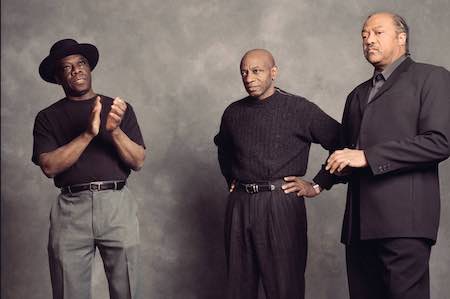Jan 13, 2026 2:09 PM
More Trump-Kennedy Center Cancellations
The fallout from the renaming of the John F. Kennedy Center for the Performing Arts to include President Donald…

From left: Andrew Cyrille, Reggie Workman and Oliver Lake
(Photo: Courtesy Jazz at Lincoln Center)In an era when contemporary jazz is largely available via streaming services and the historic music of beboppers and Swing Era bandleaders continues to reemerge in the form of vinyl reissues, Trio 3 is a wonderful anomaly.
For more than 35 years, alto saxophonist Oliver Lake, bassist Reggie Workman and drummer Andrew Cyrille have pursued a musical style grounded in the 1960s. Founded upon an avant-garde concept that was originally known as New Thing, Trio 3 relies on the wits of each member’s interpretations to express their considerable collective genius. Lake was a founding member of the World Saxophone Quartet and worked with Black Artists Group; Workman collaborated with John Coltrane; Cyrille maintained a long-term relationship with free-form piano stylist Cecil Taylor.
Trio 3’s studio albums include 2000’s Encounter, 2002’s Open Ideas, 2006’s Time Being, 2009’s At This Time (with Geri Allen), 2013’s Refraction-Breaking Glass, 2014’s Wiring (with pianist Vijay Iyer) and 2017’s Visiting Texture. But the concert stage is where Trio 3 lives, breathes and holds court from their 130 combined years of shared compositional and improvisational brilliance.
Trio 3 chose Dizzy’s Club in New York’s Columbus Circle for its final performances this February, joined by alto saxophonist Bruce Williams and Iyer.
Taking the stage for the second set of the final night, Workman introduced the group, citing its original goal to “make a new sound that hadn’t been heard before.”
The trio launched into the first of six compositions, “Synapse,” by Workman, with Williams standing in for Lake. A low, rumbling collective recitation was quickly deconstructed in call-and-response fashion, Cyrille eliciting rhythms that sounded like metallic raindrops. A rubato section followed, marked by collective blasts, shrieks and rolls, all eventually finding fruition in a briefly stated unison melody. Williams squealed and soared into the wind while Workman held the music together, his neck-spanning, low-end grip quietly, but firmly, steering the ship. Though free on its surface, there was vast internal logic in every bar of the music, forward-motion impetus from each member. The music relaxed when Iyer soloed, his fingers erupting in galloping, tic-tac-toe figures across his keyboard. The song abruptly ended with a popping slap of Cyrille’s snare.
Cyrille’s “Aubade” followed, the drummer directing the arrangement with snappy figures illustrating a playful melody. Like air escaping a balloon, musicians took turns mewling small kernels of sound like playful cartoon characters. The lively melody returned, Cyrille driving it like a humorous pied piper.
Cyrille’s bluesy “Montclair County Horn” swung in staggered fashion, then was deconstructed in jagged steps, absorbed and repeated, brilliant solo upon solo. Each musician’s improvisations incorporated and built tension, from Iyer’s funky cadences to Williams’ Jackie McLean-reflecting romp and Workman’s graceful missives.
Lake came aboard for an “open improvisation,” as Cyrille called it. Lake and Williams dueled surging squeals, trills and animal-like growls, as Iyer sauntered below, his fingers moving like hungry spiders. Cyrille ambled through, and Workman, again, held everything together amid the titanic energy of the assembled five musicians. Here was the sound of jubilation, Lake spilling high notes above, Williams riffing like a demented Johnny Hodges below.
Lake added some poetry to the mix, reciting: “Wait, bring all my food at one time, on the same plate. Dixieland, bebop, soul, rhythm and blues, swing, avant garde, jazz, free-jazz, rap. What kind of music do you play? The good kind! Aretha Franklin and Sun Ra are the same. ... Coltrane, Dixie Hummingbirds, the same. Miles, Muddy Waters, the same. Labels divide, separate. One music, different feelings and experiences. Total sound! Hear all the players as one. The history of Africa was memorized, lived, experienced now. We didn’t read it, we did it.”
Cyrille’s “Tribute To Bu” came next, the drummer playing a hypnotic open drum solo of dancing tom figures and open snare slaps. Lake joined with brazen declamations, happy toot-toots and gruff slurs, before Cyrille took back the moment and drove the music home.
Trio 3’s final moments on Dizzy’s stage came in Workman’s “Where’s Nine,” a simmering brew of pulsing chatter from Workman’s bass and bluesy bows from the altos of Lake and Williams, with Iyer and Cyrille uniting to swing the night grandly to its close.
Whatever the future may hold for Lake, Workman and Cyrille, their spirits remain strong. Their final Trio 3 performance was an unfettered gift. DB

Belá Fleck during an interview with Fredrika Whitfield on CNN.
Jan 13, 2026 2:09 PM
The fallout from the renaming of the John F. Kennedy Center for the Performing Arts to include President Donald…

Peplowski first came to prominence in legacy swing bands, including the final iteration of the Benny Goodman Orchestra, before beginning a solo career in the late 1980s.
Feb 3, 2026 12:10 AM
Ken Peplowski, a clarinetist and tenor saxophonist who straddled the worlds of traditional and modern jazz, died Feb. 2…

The success of Oregon’s first album, 1971’s Music Of Another Present Era, allowed Towner to establish a solo career.
Jan 19, 2026 5:02 PM
Ralph Towner, a guitarist and composer who blended multiple genres, including jazz — and throughout them all remained…

Rico’s Anti-Microbial Instrument Swab
Jan 19, 2026 2:48 PM
With this year’s NAMM Show right around the corner, we can look forward to plenty of new and innovative instruments…

Richie Beirach was particularly renowned for his approach to chromatic harmony, which he used to improvise reharmonizations of originals and standards.
Jan 27, 2026 11:19 AM
Richie Beirach, a pianist and composer who channeled a knowledge of modern classical music into his jazz practice,…